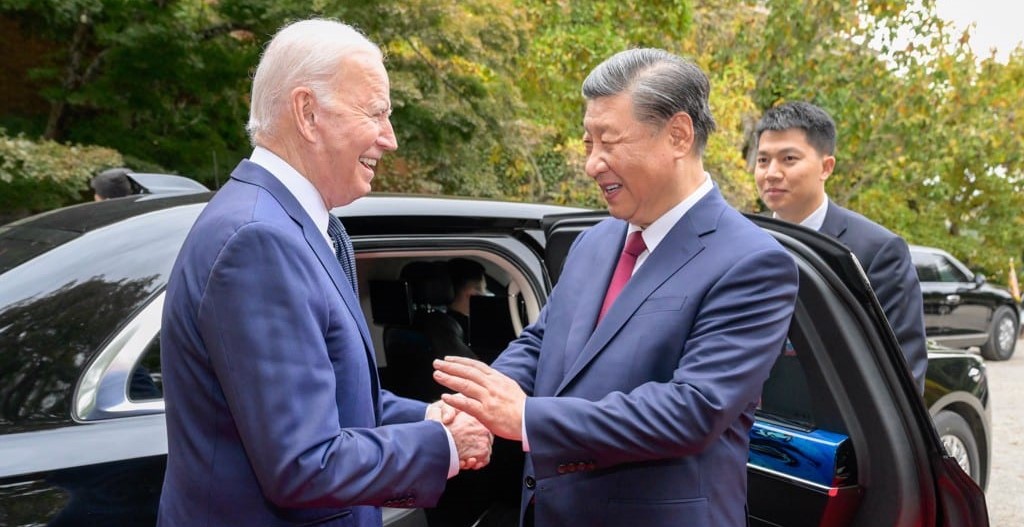As a US citizen, I have squirmed at the antagonistic attitude toward China shown by President Joe Biden and many of his top officials. It’s still true that Biden calls Xi Jinping a “dictator” and has upheld the Trump administration’s judgment that China is guilty of “genocide.” But after the November 16 summit between the two presidents, Biden no longer uses the word “decoupling” (preferring the milder “derisking”) and calls China’s foreign policy “assertive” rather than “aggressive.” Right after the summit, Biden said: “The United States will continue to compete vigorously with the PRC. But we’ll manage that competition responsibly so it doesn’t veer into conflict,” adding: “That’s what the world expects of us.” That feels like progress.
So what exactly is Biden’s policy toward China? He did not articulate it as clearly as President Xi did in his November 15 speech, subject of my last post. But here is how I would describe it – tempered with my own perspective.
- Distrust: Biden less often speaks of “democracy vs. autocracy,” in part because many of America’s friends outside of Europe are also autocracies. Clearly, though, he distrusts Xi mainly because Xi was not democratically elected, and US policy tends to lump China in with Russia, Iran, and North Korea—countries that don’t support US foreign policy in lockstep. But, as Ian Bremmer, founder of the Eurasia Group, commented recently, those countries are “rogue states”—which benefit from an unstable world—while China clearly needs a stable world to maintain its robust global trade. China is now the top trading partner for most of the world’s nations.
- Human rights: Standing up for human rights has long been a core policy of the United States, and Biden still sees China as a violator. He has used sanctions (an economic weapon) to punish Chinese individuals and supported a new law to prevent US companies from purchasing goods made in China’s far-west region of Xinjiang. It was Mike Pompeo, Trump’s extremist secretary of state, who accused Beijing of “genocide” against its Muslim Uighur citizens, but Biden has refused to remove that charge. In fact, there has been no evidence of the Chinese government killing of a single Uighur and no evidence that re-education camps set up by Beijing in 2018 to deter Islamic militant attacks are still open. Compare this: China’s zero killings of Uighurs (out of a population of 12 million) vs. Israel’s mass bombing of Gaza, which has killed more than 17,000 Gazans in the first two months of war (out of 2.2 million). To many around the world, US charges of genocide look selective and hypocritical.
- Taiwan: After the summit, Biden stressed the importance of “peace and stability in the Taiwan Straits” and reiterated US support for the one-China policy, although several times in the past he has said he would send American troops to defend Taiwan. Washington insists that the US needs to “deter” China from invading Taiwan by increasing arms sales to Taiwan. An essay in the current issue of Foreign Affairs makes a solid argument that deterrence would work only if arms sales are balanced with “reassurance.” “US military threats will lose their potency,” the writers say, “if Chinese leaders believe that the United States will take advantage of their restraint to promote Taiwan’s formal independence or to prevent unification under any circumstances.” Flooding Taiwan with US-supplied arms seems more likely to provoke a Chinese attack than deter one.
- Containment: Biden has stopped saying the US wants to “contain” China and now says he wants to “uphold a free and open Indo-Pacific region.” Yet he has tried to strengthen relations with Japan, Korea, Australia, Southeast Asia, and India, which encircle China. And he continues to send US warships and jet fighters to the South China Sea—in international waters but not far off China’s coast. His justification: the US Navy needs to patrol the South China Sea, which is on the opposite side of the planet from us, to limit China’s “coercive activities” there. It’s easy to imagine how the US would react if China sent warships to patrol international waters off the Florida or California coasts.
- Fair Trade: To support American businesses, Biden pushes for “fairness” and a “level playing field” in China, giving US companies equal access in China as Chinese companies have in the US. Biden wants to stop Beijing from its “non-market economic practices” that “disadvantage American businesses and workers.” Of course, these demands come from US companies, who are uncomfortable with Xi’s government’s raids on foreign information-gathering companies and its demands that Chinese companies procure China-made equipment. However, it’s also true that US multinational companies have long had outsized influence in countries around the world, and American companies have made huge profits in China for decades. It was they, not the Chinese, who flooded the US market with China-made goods. And it was Washington, not Beijing, that started the trade war by imposing tariffs.
- High tech threat: One area where China does pose a threat to the US is in high tech. Thanks to government subsidies, China is poised to catch up to the US in telecommunications, artificial intelligence, quantum computing, space, solar and wind power, and electric vehicles. Biden’s response has been to support strong limits on trade where US national security is at risk. In particular, the CHIPS Act restricts American exports of high-end semiconductors deemed vital to national defense and aims to keep the US edge in high-tech. Ironically, US subsidies for its semiconductor industry—a form of industrial policy—exemplify the type of “non-market economic practices” that the US accuses China of.
- Next superpower? Given its history, it seems far-fetched that China would want to replace the US as a superpower—with more than 800 military bases around the world and repeated military interventions in countries far from home. And even if China’s total economy surpassed that of the US by 2030 (increasingly unlikely), it would have a per capita income only one-quarter the size. But where China does pose a challenge is its increasing influence with countries around the world. Unlike Washington, Beijing does not pass judgment on other countries’ form of government. And it has aggravated the Biden administration by taking a neutral stance on many hot issues, including the war in Ukraine and Israel’s response in Gaza. For years, China has been cultivating relations with many countries around the world, including fellow BRICS countries Brazil, Russia, India, and South Africa, as well as developing countries that want loans for infrastructure projects through China’s Belt and Road Initiative.
Without saying so, Beijing seems to be preparing for “the rise of the rest” – a multipolar world no longer dominated by the United States. It is this vision, perhaps, that Biden and others in the Washington establishment should be watching most carefully.



